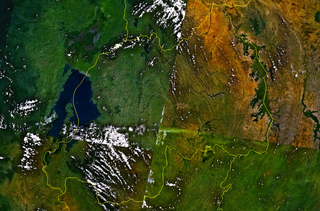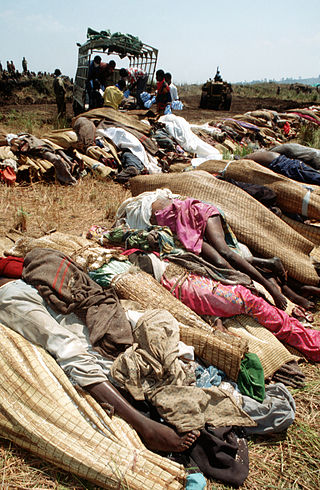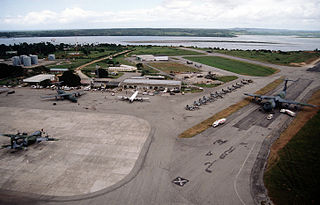
The United Nations Assistance Mission for Rwanda (UNAMIR) was established by United Nations Security Council Resolution 872 on 5 October 1993. It was intended to assist in the implementation of the Arusha Accords, signed on 4 August 1993, which was meant to end the Rwandan Civil War. The mission lasted from October 1993 to March 1996. Its activities were meant to aid the peace process between the Hutu-dominated Rwandese government and the Tutsi-dominated rebel Rwandan Patriotic Front (RPF). The UNAMIR has received much attention for its role in failing, due to the limitations of its rules of engagement, to prevent the Rwandan genocide and outbreak of fighting. Its mandate extended past the RPF overthrow of the government and into the Great Lakes refugee crisis. The mission is thus regarded as a major failure.
The Arusha Accords, officially the Peace Agreement between the Government of the Republic of Rwandaand the Rwandan Patriotic Front, also known as the Arusha Peace Agreement or Arusha negotiations, were a set of five accords signed in Arusha, Tanzania on 4 August 1993, by the government of Rwanda and the rebel Rwandan Patriotic Front (RPF), under mediation, to end a three-year Rwandan Civil War. Primarily organized by the Organisation of African Unity and the heads of state in the African Great Lakes region, the talks began on 12 July 1992, and ended on 4 August 1993, when the accords were finally signed.

Opération Turquoise was a French-led military operation in Rwanda in 1994 under the mandate of the United Nations. The "multilateral" force consisted of 2,500 troops, 32 from Senegal and the rest French. The equipment included 100 APCs, 10 helicopters, a battery of 120 mm mortars, 4 Jaguar fighter bombers, 8 Mirage fighters, and reconnaissance aircraft. The helicopters laid a trail of food, water and medicine enabling refugees to escape into eastern Zaire. Opération Turquoise is controversial for at least two reasons: accusations that it was an attempt to prop up the genocidal Hutu regime, and that its mandate undermined the UNAMIR. By facilitating 2 million Rwandan refugees to travel to Kivu provinces in Zaire, Turquoise setup the causes of the First Congo War.

The assassination of presidents Juvénal Habyarimana and Cyprien Ntaryamira in the evening of April 6, 1994 was the proximate trigger for the Rwandan genocide, which resulted in the murder of approximately 800,000 Tutsi and a smaller number of moderate Hutu. The first few days following the assassinations included a number of key events that shaped the subsequent course of the genocide. These included: the seizing of power by an interim government directed by the hard-line Akazu clique; the liquidation of opposition Hutu politicians; the implementation of plans to carry out a genocide throughout the country; and the murder of United Nations peacekeepers, contributing to the impulse of the international community to refrain from intervention.

The failure of the international community to effectively respond to the Rwandan genocide of 1994 has been the subject of significant criticism. During a period of around 100 days, between 7 April and 15 July, an estimated 500,000-1,100,000 Rwandans, mostly Tutsi and moderate Hutu, were murdered by Interahamwe militias.
Jerome Clement Bicamumpaka is a Rwandan politician. He is one of the 402 co-founders of the Rwandan political party MDR, a democratic opposition party, created in Kigali on July 1, 1991. He was born on November 4, 1957, in Mukono (Rwaza), in Ruhondo commune, Ruhengeri prefecture.

United Nations Security Council resolution 812, adopted unanimously on 12 March 1993, after expressing its alarm at the humanitarian situation in Rwanda due to the ongoing civil war, in particular the number of refugees and displaced persons which posed an international threat to peace and security, the Council called upon the Government of Rwanda, the National Republican Movement for Democracy and Development, and the Rwandan Patriotic Front to respect a ceasefire that took place on 9 March 1993 and implement other agreements they had committed themselves to. It was the first resolution on the situation in Rwanda.

United Nations Security Council resolution 872, adopted unanimously on 5 October 1993, after reaffirming resolutions 812 (1993) and 846 (1993) on the situation in Rwanda and Resolution 868 (1993) on the security of United Nations operations, the council stressed the need for an international force in the country and therefore established the United Nations Assistance Mission for Rwanda (UNAMIR).

United Nations Security Council resolution 893, adopted unanimously on 6 January 1994, after reaffirming resolutions 812 (1993), 846 (1993), 872 (1993) and 891 (1993) on Rwanda, the Council noted that the situation in Rwanda could have implications for neighbouring Burundi and authorised the deployment of a second military battalion of the United Nations Assistance Mission for Rwanda (UNAMIR) to the demilitarised zone.

United Nations Security Council resolution 909, adopted unanimously on 5 April 1994, after reaffirming resolutions 812 (1993), 846 (1993), 872 (1993), 891 (1993) and 893 (1994) on Rwanda, the Council expressed concern at deteriorating security and humanitarian situation in the country, particularly in Kigali, and extended the mandate of the United Nations Assistance Mission for Rwanda (UNAMIR) until 29 July 1994.

United Nations Security Council resolution 918 was adopted without a vote on 17 May 1994. After reaffirming all resolutions on the situation in Rwanda, particularly resolutions 872 (1993), 909 (1994) and 912 (1994), the Council expressed its alarm and condemnation at the continuing large-scale violence, and went on to impose an arms embargo on the country and authorise an expansion of the United Nations Assistance Mission for Rwanda (UNAMIR).

United Nations Security Council resolution 925, adopted unanimously on 8 June 1994, after reaffirming all resolutions on the situation in Rwanda, particularly resolutions 912 (1994) and 918 (1994), and Resolution 868 (1993) on the safety of United Nations peacekeepers, the council deployed additional battalions and extended the mandate of the United Nations Assistance Mission for Rwanda (UNAMIR) until 9 December 1994.

United Nations Security Council resolution 929, adopted on 22 June 1994, after recalling all resolutions on Rwanda, including 912 (1994), 918 (1994) and 925 (1994), the council authorised, under Chapter VII of the United Nations Charter, the temporary establishment of a multinational operation in the country to assist in humanitarian efforts and protect refugees and displaced people, until the full deployment of the expanded United Nations Assistance Mission for Rwanda (UNAMIR).

United Nations Security Council resolution 965, adopted unanimously on 30 November 1994, after reaffirming all resolutions on the situation in Rwanda, particularly resolutions 872 (1993), 912 (1994), 918 (1994), 925 (1994) and 955 (1994), the Council extended the mandate of the United Nations Assistance Mission for Rwanda (UNAMIR) until 9 June 1995 and expanded its operations.

United Nations Security Council resolution 997, adopted unanimously on 9 June 1995, after reaffirming all resolutions on the situation in Rwanda, particularly resolutions 872 (1993), 912 (1994), 918 (1994), 925 (1994), 955 (1994) and 965 (1994), the Council extended the mandate of the United Nations Assistance Mission for Rwanda (UNAMIR) until 8 December 1995 and adjusted its operations from peacekeeping to confidence-building.

United Nations Security Council resolution 1012, adopted unanimously on 28 August 1995, after considering the situation in an African landlocked country, Burundi. The council established an international inquiry over the assassination of President Melchior Ndadaye during a military coup in October 1993.

United Nations Security Council resolution 1029, adopted unanimously on 12 December 1995, after recalling previous resolutions on Rwanda, including Resolution 872 (1993), Resolution 912 (1994), Resolution 918 (1994), Resolution 925 (1994), Resolution 955 (1994), Resolution 965 (1994), Resolution 978 (1995) and Resolution 997 (1995), the Council extended the mandate of the United Nations Assistance Mission for Rwanda (UNAMIR) for a final time, ending 8 March 1996, and adjusted its mandate.

United Nations Security Council resolution 1049, adopted unanimously on 5 March 1996, after reaffirming Resolution 1040 (1996) concerning Burundi, the Council called for an end to violence in the country and discussed preparations for a conference on security in the African Great Lakes region.

United Nations Security Council resolution 1078, adopted unanimously on 9 November 1996, after expressing concern at the situation in the African Great Lakes region, the Council discussed proposals for a regional conference on security and a multinational humanitarian force in eastern Zaire.

United Nations Security Council resolution 1080, adopted unanimously on 15 November 1996, after reaffirming Resolution 1078 (1996) on the situation in the African Great Lakes region, the council, acting under Chapter VII of the United Nations Charter, established a multinational humanitarian force in eastern Zaire.















